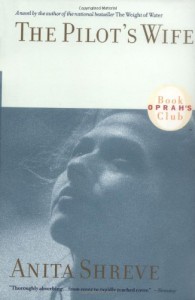 So now this is my second paper book and I will be running screaming back to my kindle for The Art of Racing in the Rain. I realize that the correlation is completely spurious, but I'm willing to operate on the assumption at the moment that even though I've heard buzz about a book if they haven't bothered with an e-version it might be worth reading.
So now this is my second paper book and I will be running screaming back to my kindle for The Art of Racing in the Rain. I realize that the correlation is completely spurious, but I'm willing to operate on the assumption at the moment that even though I've heard buzz about a book if they haven't bothered with an e-version it might be worth reading.The Pilot's Wife was a perfect example of constructed writing. My husband always complains that he can see the author's work with a lot of fiction. Typically I don't have this problem; I can fall into a story and just read it. With this novel, though I kept thinking about what I know about how Ken Follett constructs his books; every few pages there needs to be a plot twist (regardless of how unbelievable) to keep the average reader's interest. And so, Shreve attempts a cliff hanger with all her twists and turns. First, we find out that Jack is dead; then the question of foul play comes in; then there are relationship elements with Robert; then we discover that Mattie (her 14 year old daughter) is sexually active; then we discover that Jack's mother is still alive; then the question of suicide/murder comes up and then the other woman (who actually turns out to be his wife...this guy is a polygamist outside of Utah!); then we find out (as if this isn't enough) that Jack was involved with the IRA. Really it's just all too much. It's cheap and plot driven and basic drivel.
BUT the book would have been better if that was my only complaint. At that point I could at least write it off as a "candy book". Categorize it as a quick, entertaining, read with no real value as literature, but equivalent to TV entertainment. Unfortunately, Shreve tried to make it "moving" and "profound", which did nothing other than make me queasy. She makes these grand statements about love and relationships and knowing other people. She tries to create this framework for marriages in which people start off in love and just eventually become loved. I did agree with some of her thoughts; how do we know that we do know our loves ones? If we are never suspicious are we duped or trusting? There are some great ideas and themes that could be explored here.
Unfortunately, I think I would have really enjoyed a book about a woman who loses her pilot Husband and faces these questions. It would have had to have been much better written and it would have been a beautiful character piece and we would never have known the answers to our questions (and absolutely no IRA); after all "could he have articulated his own Why? Could anyone? Again, she'd never know. She could only know what she imagined to be true. What she herself decided to be true."
Next time, Shreve needs to make up her mind (and of course my bias is to leave out the plot bullshit) and try for something though provoking or just leave out all the "deep thoughts".


